Has your baby always been pretty good at feeding from the bottle, whether you are formula feeding or pumping and bottle feeding with stored breast milk, but now is your baby refusing the bottle? Are you getting worried that they are not taking in enough formula or breast milk?
Baby Refusing the Bottle?
Don’t worry. First of all, know that it can be perfectly normal and a sudden bottle refusal is something that many moms experience with their children. It doesn’t always mean that something bad is happening, and definitely doesn’t mean that there’s nothing that you can do about it.
But I get it, it can be really stressful. My first daughter was formula fed since birth and we had a couple of times when she started refusing the bottle. My partner and I hit panic mode almost instantly and were all scared she wasn’t drinking enough. Going back, I wish we took a couple of extra deep breaths and took some more time to understand what was happening without worrying so much and avoid stressing because you can’t soothe them with a bottle when they are crying anymore.
So, to help you out and take away some of your worry, I have put together here a list of causes that might explain why your baby is suddenly refusing the bottle. Plus, a whole lot of tips on how to get them to start feeding from it again. You will find some general tips that apply to both formula-fed babies and children that are bottle-fed with breastmilk (either exclusively or intermittently while breastfeeding), as well as specific tips for each one of those cases.
Related: 18 Tips on How to Soothe a Crying Baby
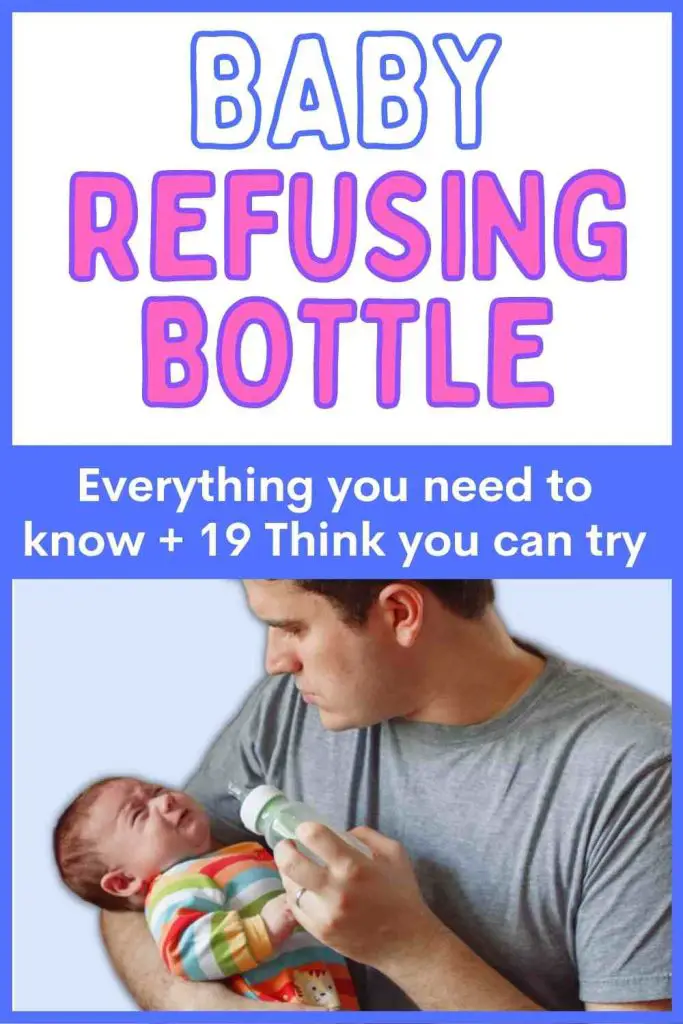
How much Milk or Formula should my Baby take?
Before I go through the causes of why baby is refusing to eat from the bottle, it’s important that you have a good understanding of how much milk or formula your baby should be taking in throughout the day, so that you are not trying to feed your child more than it needs to.
It’s quite easy to get used to a daily routine when you know exactly when you are feeding baby and how often/much. However, babies grow and change, and will start feeding formula or breastmilk less frequently until they are well established on solids. Those daily routines don’t last forever.
So, have a look at the guidelines below of how much and how often your kid should be feeding during his first year of life:
- Newborns: feed every 2 to 3 hours (or 8 to 12 times in 24 hours). They only take in half ounce per feeding for the first day or two of life, then 1 to 2 ounces per feeding after that. This amount increases to 2 to 3 ounces by 2 weeks of age.
- 2 months old Babies: 4 to 5 ounces per feeding every 3 to 4 hours.
- 4 months old Babies: 4 to 6 ounces per feeding every 3 to 4 hours.
- 6 to 9 months old Babies: up to 8 ounces every 4 to 5 hours.
- 9 to 12 months: up to 8 ounces every 6 to 8 hours.
Consider that formula-fed babies drink more but less frequently then breastfed babies, plus a lot after 6 months depends on how soon your child becomes well established on solids. Also, newborn schedules are generally much more variable than older children’s schedules. Finally, remember that these are just guidelines and every child is different.
For more detailed feeding and sleeping schedules by age, you can have a look here.
Refusing the bottle: When Should you be Worried?
While the tips below are all good tips that you can try to get your baby to start feeding from the bottle again, there are some signs that you should look out for to make sure your baby is not losing too much fluid, and that should prompt you to seek medical attention straight away. These are the following:
- Baby isn’t gaining enough weight
- Baby doesn’t have enough solid or wet diapers
While it’s normal for a breastfed newborn to loose some weight soon after birth as you are waiting for your body to start producing milk, weight loss is not normal once they are older. If you are keeping track of your baby’s weight at home and you notice a drop, make sure to get in touch with a pediatrician soon to find out the reason behind it.
Related: How to Weigh Baby at Home
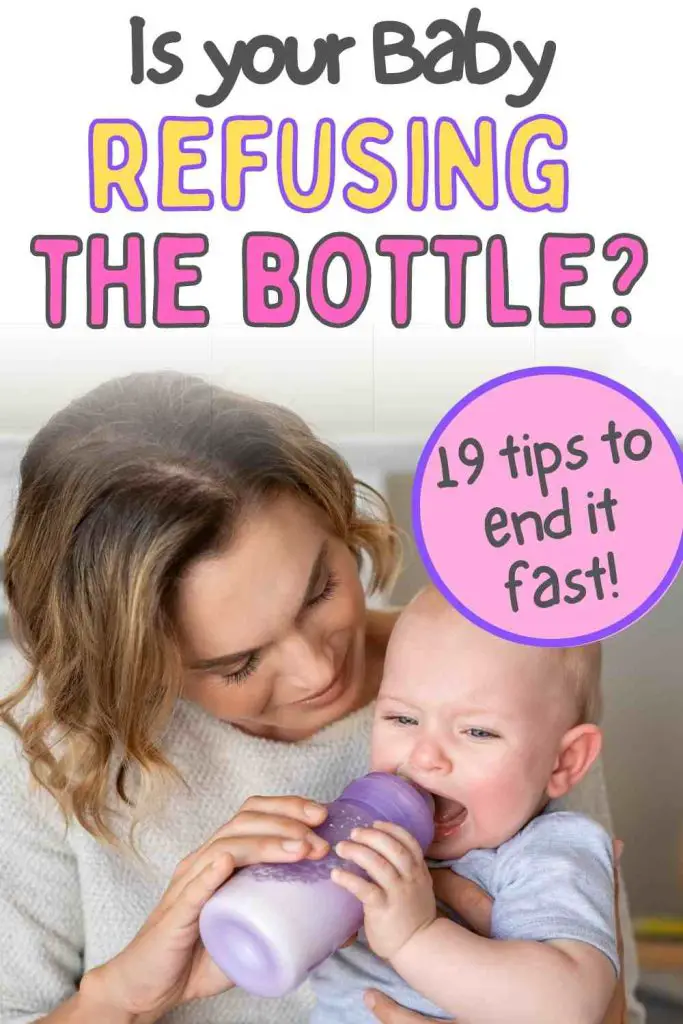
Reasons why Baby Suddenly Refuses a Bottle
Without further ado, let’s have a look at all the reasons why your baby is all of a sudden refusing the bottle.
1) Baby is Sick
We all eat less when we are sick, babies included. One of the most common reasons why a baby is suddenly refusing a bottle is that they are not feeling well.
These are all things that might get your baby to become very fussy at the bottle:
- Ear infection
- Nasal congestion, so that baby can’t breathe properly when feeding
- Sore tummy
- Gas or colic
- Acid reflux
While not all these require you to see a doctor, you should consider calling one straight away if, in addition to refusing the bottle, your baby is showing any of the following symptoms:
- Fever
- Vomiting
- Constant crying
- Diarrhea
- Difficulty breathing
In particular, vomiting and diarrhea, coupled with not drinking enough milk, can lead to severe dehydration in babies. We once had to take our daughter to hospital because she had very bad diarrhea and hardly feeding or keeping any fluids in. They had to force-feed her with a tube in her nose and we went through a hard couple of days before she got better.
2) Baby is not Hungry
Like I mentioned above, you might be feeding your child more formula or milk than what they actually need, so they are not quite hungry yet. This happens as your child gets older and the frequency of feeds decreases. It’s particularly not surprising if you have a 7 to 11 month old baby refusing the bottle, as they become more and more established on solids.
You can refer to the guidelines above and these feeding /sleeping schedules to have a look if you are offering the right about of milk or formula. But also be very aware of when your baby is displaying hunger cues – this is usually the best time to feed them.
Early hunger cues in babies are:
- Fists moving to the mouth
- Head turning to look for the breast
- Becoming more alert and active
- Sucking on hands or lip smacking
- Opening and closing mouth
Later cues are fussing and crying, but you really want to avoid getting to that stage.
3) Change in Bottle Feeding Routine
Another reason why a baby suddenly refuses a bottle could be a change in routine. Babies need time to adapt to new routines, just like adults, and might struggle to work through their feelings and emotions when that happens. This can then translate into them not wanting to feed from the bottle.
Think about what changes happened lately in your family environment and see if there’s anything that could have upset your child. Examples of some changes in routine are:
- Baby dropping a nap and change in their sleeping schedule
- Mom / Parent going back to work
- New nanny or babysitter
- Moving from a crib in the parents room, to a crib in their own room
- Holiday and new environment
We experienced this when we went for a holiday in Italy for example. Italy to New Zealand is 12 hours difference and, between the new environment and the jet lag, it took my daughter a few days to adapt and get back on a normal feeding schedule. She also struggled when her primary carer from daycare took a couple of weeks off, and she had to be fed by someone else during the day.
4) Milk or Formula Tastes Different
Have you tasted the milk or formula to check that it tastes alright? I know it might sound gross, but worth a check!
If breastmilk or formula are not stored properly they can go bad, and that’s usually the main reason why baby doesn’t like the taste anymore and is suddenly refusing the bottle. If you are traveling with breastmilk in particular, be sure to store your breastmilk in a cooler so that it doesn’t go off.
Other things that might affect the taste of the milk are:
- You didn’t clean the bottles properly
- You used the wrong ratio of formula and water
- The breastmilk or formula is too warm or too cold
- You have just changed the brand of formula
- You have eaten some foods that are altering the taste of breastmilk
Related:
– How to Store Formula Milk for Night Feeds (6 Solutions to Fit your Needs!)
– 8 Tips for Flying and Traveling with Breast Milk and a Breast Pump
5) Baby is Teething
Teething in babies is the worst! Every tooth that’s trying to cut through your baby’s gums can leave your baby in extreme discomfort and usually feels like it takes f-o-r-e-v-e-r. Because they are in discomfort, the extra pressure on the gums while feeding from the bottle might make them want to refuse it.
Teeth in babies usually start to emerge between 6 and 12 months, though that’s just a guideline again. My second daughter got her first teeth when she was 4 months old already. And these are the most common signs and symptoms:
- Irritability
- Drooling/Skin Rashes
- Coughing
- Biting and Gnawing
- Low Grade Fever
- Cheek rubbing and ear pulling
- Diarrhea
- Waking up often at night
I have personally found applying some teething powder on the gums before bedtime or feeding to be very helpful in reducing baby’s discomfort. But you can also try some teething toys, teething gel or pain medication. Plus, check out these other soothing tips for babies that are in discomfort.
Related:
- Baby Waking Up Multiple Times a Night – Here’s what you need to know!
- 18 Tips on How to Soothe a Crying Baby
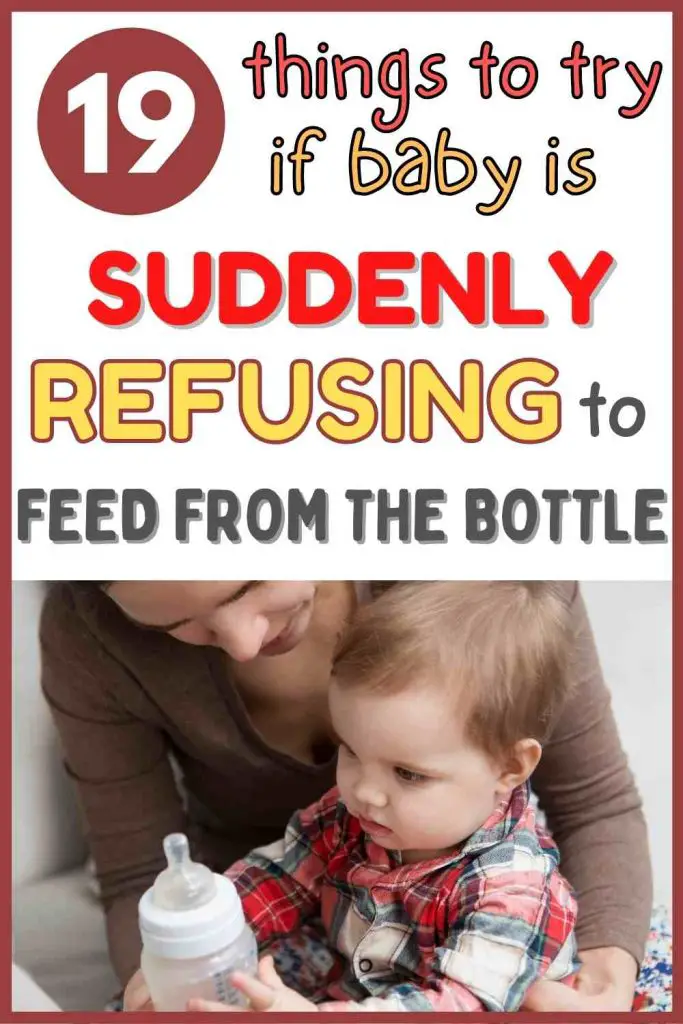
6) Baby doesn’t like the Nipple Flow
This is can be particularly true if you have a 5 or 6 month old refusing the bottle suddenly. By that age, babies have developed a strong suck and can start getting frustrated with newborn nipples that have a very slow flow.
But if you have a newborn refusing bottle, it might even be that the flow is too fast and your baby doesn’t like it because they are struggling to keep up with the flow.
We were honestly so naïve when we were bottle feeding our first daughter – we didn’t even know there were different nipple flows! We were just using the ones that came with the bottles, which were too fast flow for when she was little, and took us a while to realize why she was spitting formula up everywhere.
7) Baby prefers to Nurse
Another reason why your baby is suddenly refusing the bottle could be that, if you are also breastfeeding, they prefer to nurse rather than feeding from the bottle. And this doesn’t necessarily need to happen when your baby is still a newborn.
In fact, if your baby is suddenly refusing the bottle at 2 months or 3 months of age, it’s probably because they are going through a cognitive milestone for which sucking stops being an involuntary reflex and becomes a voluntary controlled response. Plus babies become more aware of their surroundings and can start recognizing familiar faces, so they understand when it’s not mom feeding them, and that’s all they want.
Teething or being sick can also make this worst, as babies that are also breastfeeding associate lots of comfort to the breast.
8) Baby is Ready to Drop Night Feeds
If this is the case – hurray! The good news is that your baby doesn’t really need to feed at night anymore. The not-so-good news is that some sleep training is probably on the cards so that your baby learns to go back to sleep by themselves when they wake up at night.
Usually, babies are ready to drop the night feeds by 6/7 months. This is especially true if bottle feeding – it can be a bit harder if you are breastfeeding at night.
Related:
– 6 Sleep Training Methods that Actually Work (and don’t involve Cry-It-Out!)
– How to Stop Breastfeeding a 1 Year Old at Night
9) Baby is Distracted
Have you taken notice of where you are when your are feeding your baby and they are refusing the bottle? Are you in a quite or noisy environment? Does your baby look distracted?
If there’s too much going on around you and your baby is getting too distracted, then that might be the reason why they are not taking the bottle. And if that’s how you’ve always fed your newborn, don’t be surprised if their response to the surrounding environment suddenly changes!
In fact, particularly around 4 months old, babies become much more aware of their surrounding, which can affect their behavior both during the day and the night (hello 4 month sleep regression and then 8 month sleep regression!).
10) Nipple is Worn Out
Also check that the nipple is not worn out, particularly if you are using second-hand bottles, or bottles passed down from an older sibling.
This shouldn’t be a problem if you have bought new bottles and nipples for your baby, but if they had already been used before, the nipple eventually gets worn out and becomes quite thin. Other than the fact that when they are too thin they can crack easily, your baby might also refuse the bottle because they don’t like the texture of the nipple anymore.
11) Baby has developed an Allergy
While babies don’t really become allergic to breastmilk, they can become allergic to cow-based formula. According to this article, symptoms of cow’s milk protein allergy will generally appear within the first few months of life, often (but not always) within days or weeks after introduction of cow’s milk-based formula into the diet. An infant can experience symptoms very quickly after feeding and, as a result, they might refuse the bottle because they know it doesn’t make them feel well.
Also, if you are feeding your baby expressed breastmilk, be aware that babies might be allergic to some foods that you are ingesting, and that you are passing through the breastmilk.
- Things to look out for if your think your baby might be experiencing an allergic reaction are: rashes, hives, difficulty breathing, lethargy or diarrhea. It that’s the case, make sure to contact your doctor straight away about switching to non-diary formula options or having a look at your diet if you are feeding your baby breastmilk.
12) Baby is Uncomfortable
If, for some reason, you’ve just changed the feeding position and holding baby differently while bottle feeding, then this might also be why your baby suddenly won’t take the bottle – they are uncomfortable.
If their head is twisted to the side in particular, baby will really struggle to feed because it’s hard for them to swallow.
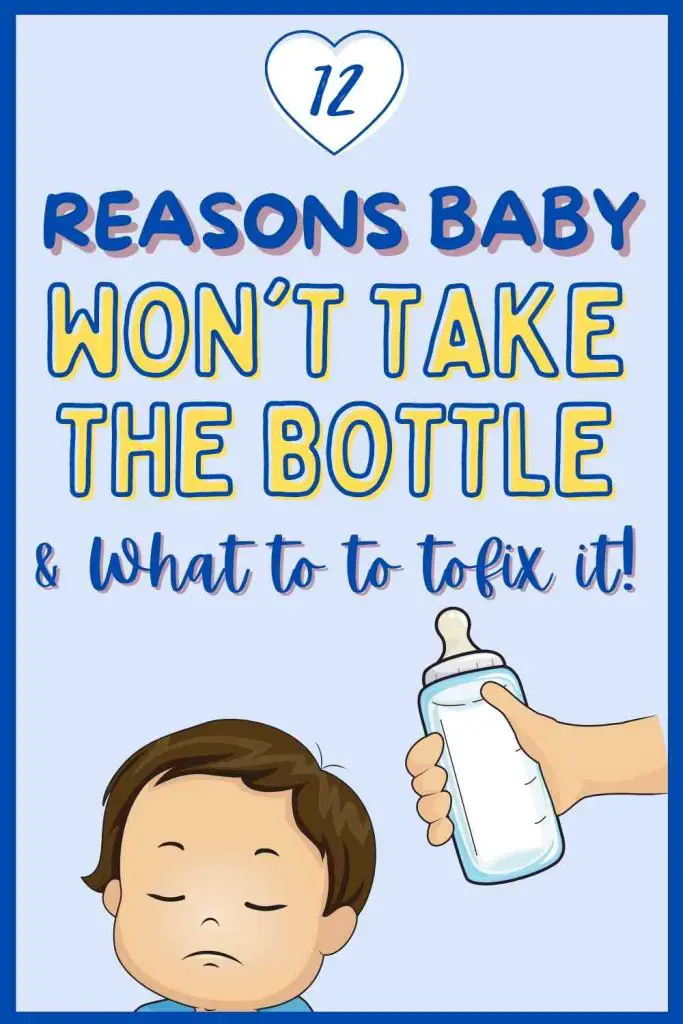
Baby Suddenly Refusing Bottle – General Tips
Now that you’ve hopefully managed to narrow down the cause of your baby suddenly refusing the bottle, here’s some tips on what you can do.
1) Don’t Panic
The first advice is really not to panic. I know it can be very stressful, particularly if it’s happened a few time in a row, but try to take a deep breath and work through the possible causes above and all the tips here.
Unless your baby starts loosing weight and is not having any more wet diapers because they are sick, then it’s probably something that you can work out and you should keep trying to offer them the bottle.
Also try to stay calm when you are feeding them: if you see that you are starting to get frustrated, it’s probably best if you let another caregiver try or try later, as babies feel and absorb your tension.
2) Try a Different Nipple Flow
Like I mentioned above, the nipple flow is very important for your baby to have a good feed. If the flow is too fast, your baby will struggle to keep up with it and will spit it all up. If, on the other hand, the flow is too slow, your baby might get frustrated because they can’t suck milk out fast enough.
If you are botte feeding a newborn, I encourage you to start with the slowest flow, then increase to the medium and finally the fast flow nipple once baby gets older and you see that they are getting a bit frustrated during the feed.
We actually never used the fastest flow nipples, as our daughter was quite happy with the medium flow until she stopped dinking formula. So, really go with your baby’s cues.
3) Try a Different Bottle
One of the first tips is also to try a different bottle. Babies can be very particular about the bottles that they like or don’t like. This can be particularly true for babies that have only been recently introduced to bottle feeding.
Try some different types and see if your baby reacts any different. I don’t particularly think there’s any bottle that’s better than the others: it really comes down to what your baby likes.
4) Try Paced Bottle Feeding
Paced Bottle Feeding is a way of bottle feeding that mimics breastfeeding. It slows down the flow of milk from the bottle, allowing your baby to feed more slowly (“pacing” themselves) and take more breaks. This avoids feeding too fast or overfeeding, which usually results in discomfort for the baby, spitting up and fussiness.
It pretty much works by feeding your baby in more of a vertical position, and keeping the bottle horizontal, so that the milk doesn’t just flow out of the bottle. Instead, baby needs to actively suck to draw it out.
I definitely encourage you to try it if your baby suddenly refuses the bottle. It really might be because they are in discomfort as a consequence of feeding too fast. And it has so many other added benefits, such as:
- Less risk of colic or acid reflux
- Less risk of ear infections
- It helps if your baby is congested (because the baby is fed in a vertical position)
Related: Paced Bottle Feeding (Benefits & Tips to do it Right!)
4) Make sure Bottles are cleaned properly
Make sure to clean the bottles properly. Leftover soap or milk residue can really affect the taste of the milk of formula and that’s why baby won’t take the bottle.
I have a few formula and bottle feeding tips, but here’s my best tips for cleaning bottles:
- Use a Brush with a Nipple Cleaner: it’s hard to clean the nipple properly otherwise
- Use a Dishwashing Basket for Bottles, so it’s easier to stack your bottles in the dishwasher
- Use a Microwave Sterilizer that will sterilize your bottles in no time
Related: 25 Formula & Bottle Feeding Tips (to Make it Easier!)
6) Make sure Milk or Formula is at the right Temperature
Some babies prefer their milk or formula colder, some babies prefer it warmer. Therefore, if the temperature of their milk is different than usual, they might not like it.
You can try using a bottle warmer, that will make sure the bottle is always being warmed up for the exact same amount of time. We really loved using one as we found it was too stressful to boil some water, stick the bottle in and constantly check if the formula was warm enough or not.
Another hack we found for formula feeding, particularly if one the go, is to find out exactly what the ratio of cold and boiling water needs to be to achieve the perfect water temperature that you can add the formula to. This way, all you need to do is take some cold water with you, get some boiling water from a café or restaurant, mix them up and add the formula – voila!
7) Find a Quiet Spot
If your most-likely 4 month old baby is suddenly too distracted by the world around him while feeding that they are refusing the bottle, then try feeding him somewhere more quiet.
This actually applies to both breastfeeding and bottle feeding. I found with my second daughter, who was breastfed, I had to hide in the bedroom to feed her, as she was too entertained by her older sister to feed properly otherwise.
8) Have you changed Feeding Position?
Have you changed feeding position lately by any chance? Or has someone different started feeding your baby instead of you?
We’ve looked at how holing baby in a different feeding position might make them uncomfortable, and this is why they are refusing the bottle. So, try changing position again: see if baby prefers feeding on the left or on the right, more vertically or more horizontally, etc.
If someone new is feeding your baby (i.e. a babysitter), it might be worthwhile having a look at how they are holding their baby and give them some feedback with regards to how they should be holding your child when giving them the bottle.
9) Try a New Nipple
If your nipples are very old (maybe your bought the bottles second-hand, or you’ve used them for more than one kid), also try buying new nipples. It might be that the old ones are too old and worn out, and your baby doesn’t like the texture anymore.
If not, definitely make sure that the old ones are not damaged or cracked!
10) Drop the Night Feed(s)
Depending on how old your baby is, how well established they are on solids, and how much they feed before going to bed, if your baby suddenly refuses the bottle at night, then they are probably ready to drop the night feed(s). This usually happens around 6 to 7 months, particularly when bottle feeding instead of breastfeeding.
If you think your baby is ready, try settle them back to sleep without the bottle. If baby keeps waking up multiple times a night and you definitely know they don’t need a feed anymore, then check out these useful posts:
- Baby Waking Up Multiple Times a Night: here’s what you need to know!
- 6 Sleep Training Methods that Actually work (and don’t involve Cry-It-Out!)
11) Be Extra Patient
This tip goes hand in hand with the first one on the list but, if your baby soddenly won’t take bottle, be extra patient and try not to get too forceful or frustrated. Instead, try be extra patient and caring.
Remember that one of the main reason why babies suddenly refuse the bottle is because they are sick. If that is the case, give them extra cuddles and love. And, unless there are reasons for concern (i.e. dehydration), just wait to feed them and only offer a bottle again when they seem ready.
12) Are you Storing Milk / Formula Properly?
If breastmilk or formula are not stored properly they can go bad, and your baby sure won’t like the taste. Breastmilk, for example, lasts longer than formula: up to 5 days in the fridge and 6 to 8 hours at room temperature. Whereas formula only lasts for about an hour at room temperature, and 24 hours in the fridge.
You can have a look at some information on how to store expressed milk here, or how to store formula milk here. There’s also some tips here on how to store breastmilk when flying or traveling. However, if you are not sure whether you are storing your baby’s feeds properly, especially if you are pumping, I would highly recommend you enroll in one of these breastfeeding courses, including free classes (some are targeted exclusively for pumping moms). The freezing and thawing process in particular needs to be done properly.
13) Ask your Pediatrician
If you are getting worried, you are unsure as to what the cause of your baby suddenly refusing the bottle is, and none of the tips here seem to help, don’t hesitate to call the doctor or see your pediatrician!
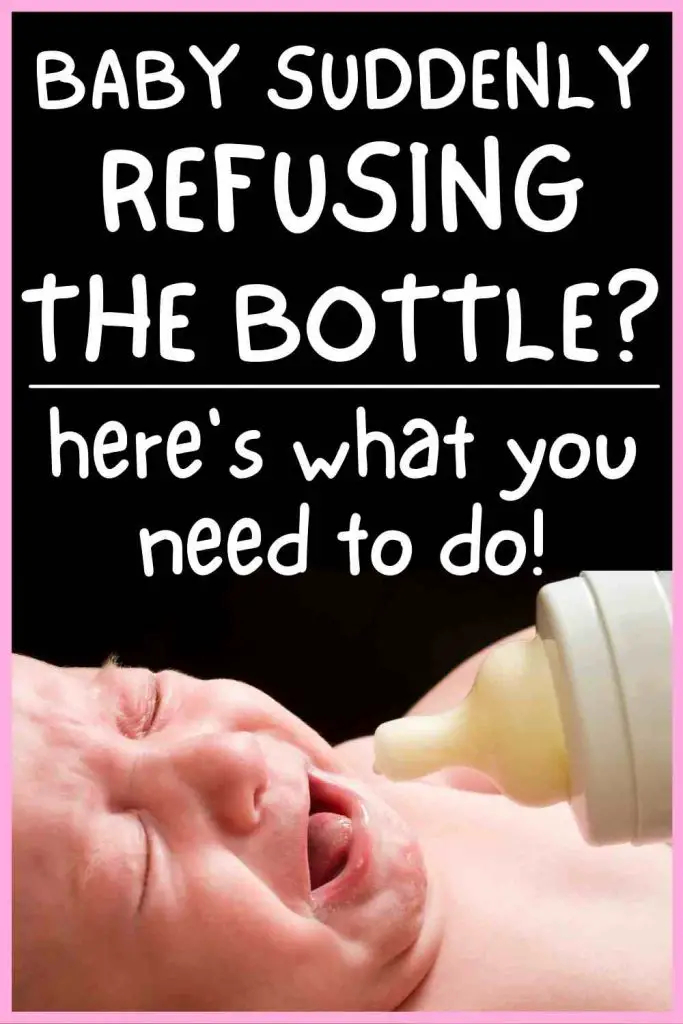
Breastfed Baby Suddenly Refusing Bottle
These tips are specific to babies that are breastfed as well as bottle fed, or babies that are fed with expressed breastmilk.
1) Have someone else feed your Baby
As mentioned above, babies create a strong bond with their breastfeeding mom and can smell the milk when they are being held by you. When that happens, particularly if they are in need of some extra comfort nursing and cuddles, they might start refusing the bottle. They know there is an alternative and the bottle ain’t gonna cut it for them 🙂
If this is what’s happening to you, then try have someone else feed the baby: the other parent or another caregiver. I know it can be tough, as feeding your baby is a very bonding moment for you as well, but try it a few times and see if it helps getting your child used to the bottle again.
You can also try putting a few drops of breastmilk on the tip of the nipple before handing the bottle over, so that your baby will recognize it and hopefully starts sucking on it.
2) Watch what you are Eating
What you eat can affect your breastmilk when you are breastfeeding or, in your case, bottle feeding expressed milk. So, watch what you are eating.
If you notice that your baby always gets fussy at the bottle after you’ve eaten certain meals, then there’s a chance the two things are related. There are certain foods that are said to increase gas in babies for example, such as beans, broccoli or cabbage. And some babies might not like if you had a very spicy dinner last night (when you don’t usually eat spicy!).
Also, remember to look for signs of allergy, as your baby may have developed a reaction to a food that you are ingesting.
3) Use a Bottle Designed for Breastfed Babies
You can also try a bottle that’s more designed for breastfed babies. Now, there’s a bit of a debate on what makes a bottle (or nipple) good for breastfed babies…
Some people say they should use narrower nipples, like the ones from the Dr. Brown’s Bottles or ThinkBaby bottles, because they allow for a deeper latch like when breastfeeding.
Other people recommend a wider nipple that better resembles the shape of the breast, such as the one from the Tommee Tippee or Philip Avents bottles.
I personally don’t think that the shape of the bottle nipple matters that much. If you think about the breast nipple, it changes in shape when baby is breastfeeding, and that change in shape can’t really be replicated by the bottle. So it probably is, once again, about what baby prefers.
That said, if you want to give these a try, here’s a list of the 7 best bottles for breastfed babies according to Very Well Family.
Formula Fed Baby Suddenly Refusing Bottle
If instead of breastmilk, your baby is refusing formula all of a sudden, then these tips are just for you.
1) Are you Mixing the Correct Ratio of Formula and Water?
Formula needs to be made by mixing the right amount of water and formula: if you are getting the ratio slightly wrong, then that might be why baby is refusing formula all of a sudden. They probably don’t like it because it’s too dense or too diluted.
Double check on your formula tin what the ratio of formula and water should be. Or, if you like gadgets that do everything for you, check out this Formula Maker that mixes and warms formula up for you instantly. Man, I wish I had this one when I was doing night feeds with my daughter!
2) Prepare Formula on the spot instead of before leaving home
If you are going out, I know you can prepare formula before leaving home and then take a Portable Baby Bottle Warmer with you. However, it’s not easy to get the right temperature for your baby formula, and that might be why your baby doesn’t like it.
One of my formula feeding tips is to take some cold and hot water from home (or get some hot water from a café – people are always keen to help with this!) and some formula in a formula dispenser, then make the bottle only when I am about to feed my baby. The trick is to get the water at the right temperature when mixing the hot and cold water and before adding the formula: I would recommend you do a few try runs at home to get used to the ratio, and always check it with a finger before adding the formula.
Related: 25 Formula & Bottle Feeding Tips (to Make it Easier!)
3) Have You Changed Formula?
This is almost a given, but have you just changed the brand of formula you are using? If so, baby might need some time to get used to the new taste.
I remember when we went to Italy for a whole month we had to switch formula with a brand from Italy and, between the new taste and the jet lag, we struggled bottle feeding our daughter for a few days.
If you haven’t changed it, then I would take this opportunity to try a new brand. Try in particular a non cow-based formula, in case your baby is allergic to cow’s milk protein, and look out for signs of allergy listed above.
I would leave this tip for last though, as if this is not the case, then you might just risk increasing your baby’s fussiness by introducing something new.
Baby Suddenly Refusing Bottle: Final Thoughts
Here it is mama – all my tips to identify the cause of your baby suddenly refusing the bottle, and things that you can try to get them to start feeding again soon.
I know it can be really stressful and overwhelming if this is happening to you, particularly when you are probably already sleep deprived and fighting the symptoms of sleep regressions and growth spurs! But I am confident that, if you take the time to go through this list, you will manage to rectify the problem soon enough.
If, at any point, it all gets too hard or worrying, do not hesitate to call your doctor or go and see your pediatrician. If your baby is not feeding because he’s sick, then you do want to get to the bottom of it sooner rather than later.
For other useful tips with regards to baby feeding, also check out these related articles:
- 20+ Best Online Breastfeeding Courses of 2021 (FREE Classes too!)
- How to Stop Breastfeeding a 1 Year Old at Night
- Sudden Drop in Milk Supply (Signs, Causes & How to Fix it!)
- Paced Bottle Feeding (Benefits & Tips to do it Right!)
- 25 Formula & Bottle Feeding Tips (to Make it Easier!)
- 14 Drinks that Increase Milk Supply
- How to Store Formula Milk for Night Feeds (6 Solutions to Fit your Needs!)
- 8 Tips for Flying and Traveling with Breast Milk and a Breast Pump
Are you a mom whose baby is suddenly refusing the bottle and have some extra questions? Or have you already experienced this in the past and have some extra tips for other moms that I haven’t listed above? Then please let me know in the comments below – I’d love to hear from you!
Did you find this useful? Pin It!
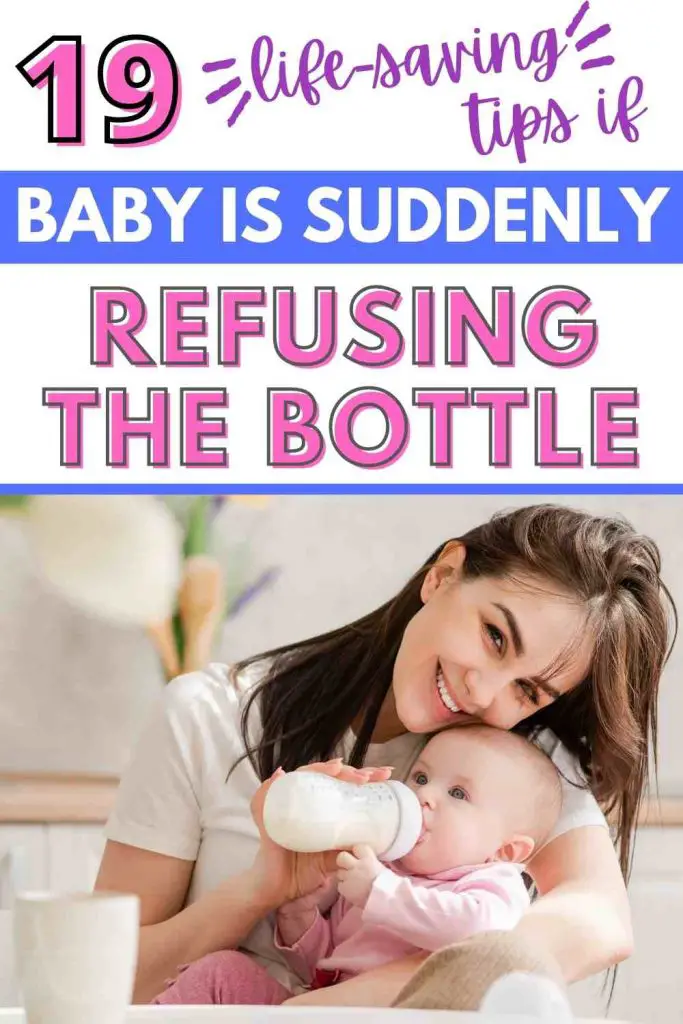

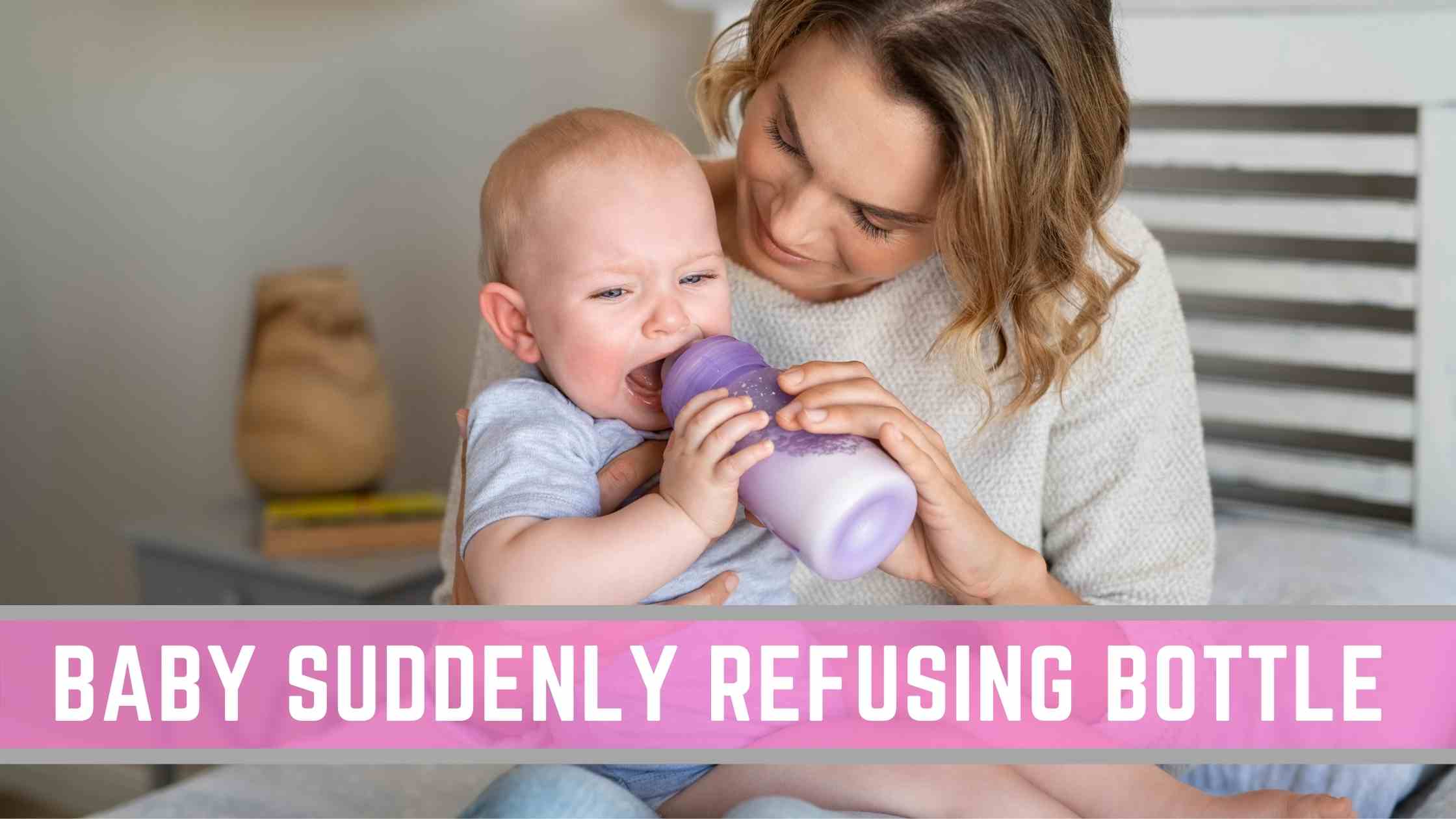
One thing to mention, which we personally experienced, was a behavioral bottle feeding aversion due to being pressured to feed. These are actually more common that people thing and just another point for your post which is already very detailed and well done.
Thanks so much Skye for sharing your experience! Definitely didn’t know that could also lead to baby refusing the bottle, and I am sure it will help some other mom going through a similar experience 🙂
So interesting post! It is great to educate before you become a parent! Thanks for sharing!
This was a super helpful post! Thanks for sharing! I didn’t realize that there were so many different reasons why a baby might refuse a bottle!
Thanks Marie for the feedback 🙂
That’s a wonder list! I never bottle fed my littles, so I never had the struggle with bottles, but I have seen so many of my friends deal with it. Great help! Thanks for sharing